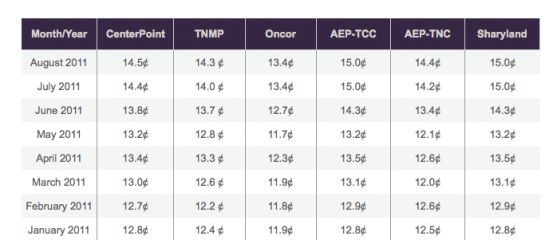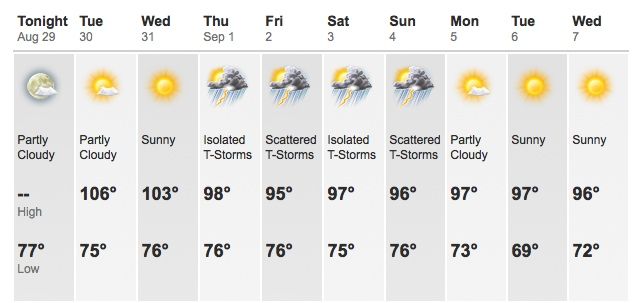Texas is more than a month into a brutal heat wave that is straining the electrical grid and setting temperature records, electricity usage records, and power pricing records. It was 105 degrees Fahrenheit in Austin and 109 degrees F in Houston over the weekend, and those triple-digit temperatures are expected to continue until it cools down to the high nineties later this week.
- Temperatures: Triple digits
- System load: Aug 29: 65,711 megawatts (California CaISO system peak in 2010 was 47,350 megawatts)
- Retail power pricing: $0.134 to $0.150 per kilowatt-hour
Statement from ERCOT:
"As we expected, this weekend’s temperatures and electricity usage have been record-breaking. ERCOT broke a new record yesterday for peak weekend usage and it’s likely that we’ll hit a new all-time peak demand record on Monday or Tuesday. We can’t stress this enough; we need everyone to conserve electricity from 3-7 p.m. If every person in ERCOT does a little, it makes a huge difference."
Here's a live look from the ERCOT website.
ERCOT (The Electric Reliability Council of Texas) is one of eight (ISOs) Independent System Operators in North America. The ERCOT region covers the entire Texas Interconnection, which includes almost all of the state of Texas and serves about 23 million people.
Here's a look at current retail Texas electricity market kilowatt-hour prices from the Potentia Energy site:

ERCOT suggests, "Consumers can help by shutting off unnecessary lights and electrical appliances between 3 and 7 p.m., and by delaying laundry and other activities requiring electricity-consuming appliances until later in the evening."
This type of peak usage puts ERCOT's grid one power plant failure away from rolling blackouts.
Peak-hour demand has exceeded 66,000 megawatts on 15 weekdays this month and exceeded 67,000 megawatts on at least five days, according to initial data from ERCOT. That far outpaces last summer when power demand peaked at 65,776 megawatts during the first week of school in late August, according to a Reuters article.
Adding energy storage to the grid might prevent these types of problems when energy storage pricing comes in line, technology becomes reliable, and regulatory forces incorporate storage into the energy mix. That energy storage could be CAES, flywheels, batteries, flow batteries, or molten salt storage from CSP plants.
According to Edward G. Cazalet, VP and Co-Founder of MegaWatt Storage Farms, peakers and storage are not economic solutions to these peak conditions. He added, "The PUCT needs to strongly encourage hourly variable pricing rather than monthly variable pricing. Retail customers need to pay at least the wholesale price of $3,000 per megawatt-hour in shortage situations."

Austin weather chart from The Weather Channel



